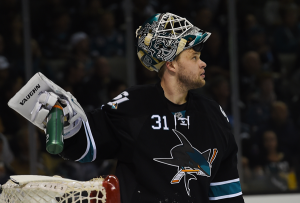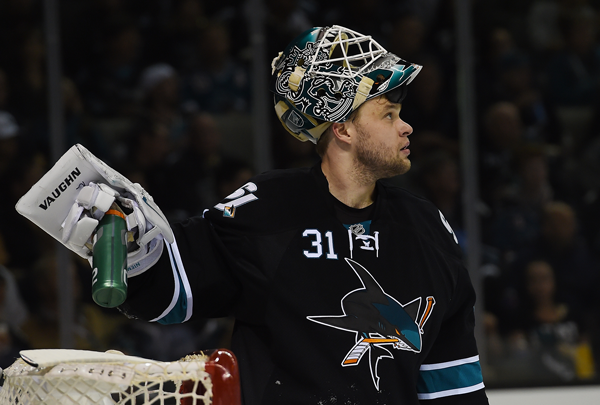
The label for playoff choker is thrown around very modestly when it comes to professional sports teams. Coming into the season, the San Jose Sharks were no different, having earned the label at times and being unfairly given it at others.
After blowing a 3-0 series leading in their first round matchup with the rival Los Angeles Kings, the Sharks became the definition of playoff failure.
The Sharks became just the fourth team in NHL history to have a collapse of this proportion after losing game 7 at home 5-1. Ironically they are also the last team to be forced into a game 7 after previously blowing a 3-0 to Detroit in the 2010-2011 season.
After the decisive game 7 at home, many of the Sharks players voiced their inability to retort the label of playoff chokers. Many of them noted this being the lowest points in their careers and for the organization as a whole.
General Manager Doug Wilson and head coach Todd McLellan echoed those sentiments. Both showed anger, frustration and displeasure to new levels during their respective exit interviews when the Sharks cleaned out their lockers.
Among the many details they each mentioned as causes for the collapse, the ability of the star players to score was chief among them.
Joe Thornton, Patrick Marleau, Joe Pavelski and Logan Couture and Brent Burns should not go a seven-game series scoring as many points (19) as James Sheppard, Matt Nieto, Tomas Hertl, Tommy Wingels and Raffi Torres.
In a perfect world that kind of secondary scoring would be a blessing, especially considering that’s been one of the weakest aspects of past Sharks playoff teams.
But when you’re trying to close a team out, Sheppard and defenseman Matt Irwin shouldn’t be the only goal scorers in the last three games of a series. That’s a recipe for disaster.
Joe Thornton in particular got overpowered by Kings center and Selke Trophy nominee Anze Kopitar. While Kopitar remains a highly under-appreciated player, especially for his ability to shut down opposing players, Thornton really struggled in the matchup in just about every aspect.
Some people believe the Sharks’ failures in this postseason were reflective of Thornton’s passive play. Being the Captain of the team, he must bear a good portion of the blame.
Antti Niemi should also not be outplayed by Alex Stalock. That was the case for most of the regular season and curiously in the postseason, despite Niemi’s struggles, Stalock didn’t get a start until Game 6 when the Kings had all the momentum.
It’s well-known that the Sharks’ coaching staff puts a lot of emphasis on playoff experience and it is a vital part of succeeding this time of year. However, having Game 7 experience didn’t seem like it should have any bearing on the way Niemi had played the whole series which was poor.
In a series when you’re opposing Jonathan Quick behind the Los Angeles defense, your goalie has to be at his best, whomever it may be. Niemi got away with spotty play the first few games because the Sharks were able to score in bunches on Quick while the Kings got uncharacteristically sloppy with their defensive play.
The defense took a huge blow when Marc-Edouard Vlasic got hurt in game seven. It became plainly visible just how important he is to this team with not only his defensive play but his ability to start the Sharks’ transition game and make good first passes out of his zone.
The Sharks got comfortable with the lead in the series, it’s as simple as that. They didn’t make the necessary adjustments when needed although according to McLellan’s comments, they practiced on preventing the very things that doomed them in the final few games.
The Sharks focused on reducing the number of odd-man rushes the Kings had and trying to get the power play to shoot more in practice the last two to three games. Those were arguably the two areas most responsible for faltering as the struggled in each area in the closing games.
They saw the first few games of the series as the norm rather than an anomaly. They continued to play on par with that mindset while the Kings adjusted, progressively got better and forced their style of play on the Sharks.
Changes need to be made after a series like this. As opposed to last season when the Sharks were also ousted in seven games by the Kings in the second round, the status quo won’t do.
It would appear that a major change could be coming to the core group of forwards and there were already some interesting free agent decisions coming into play this off-season with Dan Boyle and Alex Stalock reaching unrestricted free agency.
The new playoff format forces teams to have to go through fellow division members in at least one round if not two.
The Kings have gotten the better of the Sharks for two straight seasons and it’s up to management and the coaches to figure out how to get by them in the coming seasons. That is a matchup that will be frequently revisited based on how the teams are set up.
It’s easy to dissect every piece of a team that struggles to close out an opponent in the playoffs after being up 3-0; the sad truth is that this tale is all too familiar for the Sharks organization and to the fan base.
San Jose Sharks – Tejus covers the San Jose Sharks for Inside Edge Hockey News. I am a longtime Sharks fan who instantly fell for the game of hockey after being introduced to the sport by a friend. I would love to work in the world of hockey in some capacity some day. I play guitar in band and enjoy making movies which stems from my initial experience of cutting Sharks games into personal highlight films.

